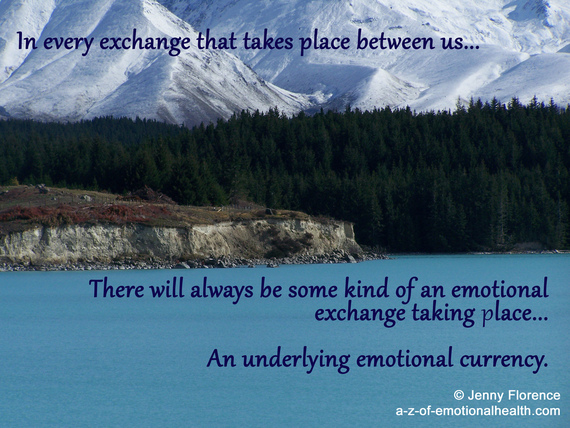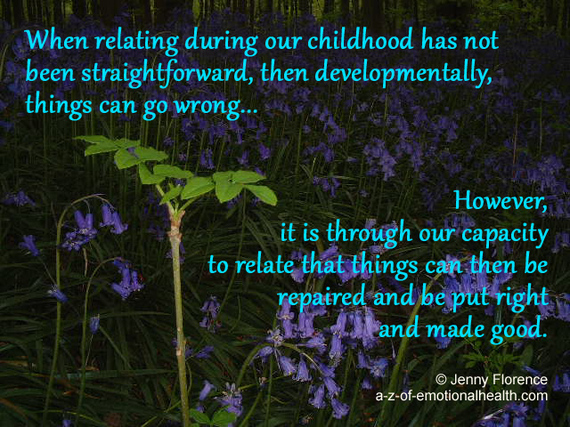
In every exchange that takes place between us there are many layers of communication and whether it's an event or a verbal communication, there will always be some kind of an underlying emotional exchange taking place, like an emotional currency being passed between us.
Deep down inside of ourselves, we feel these emotional exchanges taking place. However, we may not know quite how to recognize them, or how to interpret what's actually going on, especially when there's a discrepancy between the appearance of something and the way that it actually feels. When this happens we can struggle to try and comprehend or work out what is actually taking place. It doesn't help that our emotions are not visible, they are unseen and yet powerful beyond measure. Let me give you some examples of the kinds of exchanges that I'm talking about.
If I were to give a gift to somebody, and I gave it freely with joy, love and appreciation, then when they receive that gift, they will also receive the emotional gift. They will receive the emotional package of joy and love and appreciation. It will feel good.
However, if I were to give the same gift to somebody, but I gave it out of guilt, obligation and duty, then even though the event may appear to be exactly the same, the emotional package that comes with it will create a completely different exchange. It won't feel the same.
Let's say that I were then to give the very same gift to somebody but I chose to do so, but with an ulterior motive, with a plan in mind, so that at a later date I could call in a favor. Like scoring brownie points in advance, a gesture given, knowing full well that I intend to manoeuvre somebody into a position at a later date where they would feel obligated to give me what I want. The gift may appear to be delightful; however the emotional package that comes with it is absolutely loaded.
The outcome of this kind of exchange will be determined by the awareness of the receiver and of their ability to process, to know, and to understand what is actually being given to them. It will depend upon their ability to recognize the underlying emotional currency and this will depend upon the extent of their own emotional language and their ability to recognize and relate to their own emotional experience. Even as adults we can struggle to see exactly what is going on, however, when we are children, these kind of laden exchanges create real difficulty in the development of trust.
Human beings are 100 percent relational, this is how we learn, and this is how we grow. If as children, we haven't been related to in a straightforward manner, then in our adult lives it will interfere with our ability to relate to others. Straightforwardness will be out of our realm of experience. These kinds of inconsistencies and discrepancies create an underlying uncertainty and mistrust of the motives of others, sometimes even a direct fear of letting anyone close. Relationships can be fraught with a deep-seated anticipation of difficulty, generating anxiety and mistrust. Indeed the confusion of these inconsistent experiences may even have left us with an underlying mistrust of ourselves and of our own innermost feelings.
To cope with this we develop complex systems of self-protection, keeping people at a safe distance and generating inner isolation. This is actually an attempt to find a solution to a problem. However, the difficulty is that the solution actually then becomes the problem. Remember human beings are 100 percent relational. This is how we grow and this is how we develop. When relating in our childhood has not been straightforward, then developmentally, things can go wrong. However, it is actually through our capacity to relate, that things can then be repaired and be put right and made good.
The more isolated we are then the harder it is to engage in some kind of relationship that will help us to find resolution to our internal difficulty and distress. The very things that we have put in place to protect ourselves are now the very things that are in the way of us moving forwards and seeking the help that we need. They have "past their sell by date" and are no longer working for us.
A life that is fortified in self-protection and emotional isolation, regardless of the front that is presented to the world, will remain locked in a perpetual cycle of distress. Unlike physical difficulty, emotional difficulty is still steeped in stigma with many people believing that any form of emotional difficulty is a weakness. Despite their invisibility, our emotions are powerful beyond measure and they are present in every aspect of our lives.
Our emotions are continually informing us, giving us the information that we need in order to process what is taking place in our lives so that we can make appropriate decisions and healthy choices. And yet many of us have never learned to listen to our own emotional experiences, we have never learned to listen to our own emotional voice.
Our capacity to learn an emotional language and our ability to relate primarily to ourselves, as well as to others, will dictate whether or not we can learn to process, understand and indeed move on from any of our past emotionally laden experiences.

